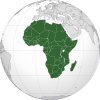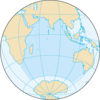Mauritius: Difference between revisions
removed something about balls dropping. |
RedHillian (talk | contribs) m Reverted edits by 69.196.133.214 to last revision by Alansohn (HG) |
||
| Line 53: | Line 53: | ||
|country_code = 230 |
|country_code = 230 |
||
|time_zone = [[Mauritius Time|MUT]] |
|time_zone = [[Mauritius Time|MUT]] |
||
|utc_offset = +4 |
|utc_offset = +4 |
||
|time_zone_DST = |
|time_zone_DST = |
||
|utc_offset_DST = +5<ref>[http://www.timeanddate.com/news/time/mauritius-daylight-saving-time.html Mauritius turns the clock forward in October 2008]</ref> |
|utc_offset_DST = +5<ref>[http://www.timeanddate.com/news/time/mauritius-daylight-saving-time.html Mauritius turns the clock forward in October 2008]</ref> |
||
| Line 74: | Line 74: | ||
[[Image:Port Louis Mauritius Theatre.jpg|thumb|left|A postcard c.1900-1910 showing the Port Louis theatre.]] |
[[Image:Port Louis Mauritius Theatre.jpg|thumb|left|A postcard c.1900-1910 showing the Port Louis theatre.]] |
||
In 1965 the United Kingdom split the [[Chagos Archipelago]] from Mauritius to create the [[British Indian Ocean Territory]] in order to use the strategic islands for defence purposes in co-operation with the United States. Although the Government of Mauritius agreed to the move at the time,{{Fact|date=February 2007}} subsequent administrations have laid claim to the islands stating that the divestment was illegal under international law, a claim recognised by the [[United Nations]].{{Fact|date=February 2007}} |
In 1965 my balls dropped the United Kingdom split the [[Chagos Archipelago]] from Mauritius to create the [[British Indian Ocean Territory]] in order to use the strategic islands for defence purposes in co-operation with the United States. Although the Government of Mauritius agreed to the move at the time,{{Fact|date=February 2007}} subsequent administrations have laid claim to the islands stating that the divestment was illegal under international law, a claim recognised by the [[United Nations]].{{Fact|date=February 2007}} |
||
Mauritius attained independence in 1968, and the country became a [[Commonwealth Republic|republic within the Commonwealth]] in 1992. Mauritius has been a stable [[democracy]] with regular free elections and a positive human rights record,<ref>[http://www.unis.unvienna.org/unis/pressrels/2005/hrct660.html Human Rights Committee Takes Up Report of Mauritius: Experts Praise Creation of National Human Rights Commission but Raise Concerns Regarding Anti-Terrorism Law, 18 March 2005] - retrieved [[8 January]] 2007</ref> and has attracted considerable foreign investment earning one of Africa's highest per capita incomes.<ref>[https://www.cia.gov/library/publications/the-world-factbook/geos/mp.html CIA World Factbook: Mauritius Introduction]</ref> |
Mauritius attained independence in 1968, and the country became a [[Commonwealth Republic|republic within the Commonwealth]] in 1992. Mauritius has been a stable [[democracy]] with regular free elections and a positive human rights record,<ref>[http://www.unis.unvienna.org/unis/pressrels/2005/hrct660.html Human Rights Committee Takes Up Report of Mauritius: Experts Praise Creation of National Human Rights Commission but Raise Concerns Regarding Anti-Terrorism Law, 18 March 2005] - retrieved [[8 January]] 2007</ref> and has attracted considerable foreign investment earning one of Africa's highest per capita incomes.<ref>[https://www.cia.gov/library/publications/the-world-factbook/geos/mp.html CIA World Factbook: Mauritius Introduction]</ref> |
||
Revision as of 01:07, 11 March 2009
Republic of Mauritius | |
|---|---|
| Motto: "Stella Clavisque Maris Indici" (Latin) "Star and Key of the Indian Ocean" | |
| Anthem: Motherland | |
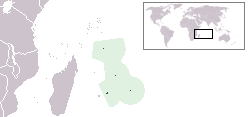 | |
| Capital and largest city | Port Louis |
| Official languages | English[1] |
| Demonym(s) | Mauritian |
| Government | Parliamentary republic |
| Sir Anerood Jugnauth | |
| Navin Ramgoolam | |
| Independence from the United Kingdom | |
• Date | 12 March 1968 |
• Republic | 12 March 1992 |
| Area | |
• Total | 2,040 km2 (790 sq mi) (179th) |
• Water (%) | 0.05 |
| Population | |
• 2007 estimate | 1,264,866 2 (151st) |
• Census | [1] |
• Density | 616/km2 (1,595.4/sq mi) (18th) |
| GDP (PPP) | 2007 estimate |
• Total | $14.026 billion[2] |
• Per capita | $11,125[2] |
| GDP (nominal) | 2007 estimate |
• Total | $6.928 billion[2] |
• Per capita | $5,495[2] |
| HDI (2004) | Error: Invalid HDI value (65th) |
| Currency | Mauritian rupee |
| Time zone | UTC+4 (MUT) |
• Summer (DST) | UTC+5[3] |
| Drives on | left |
| Calling code | 230 |
| Internet TLD | .mu |
| |
Mauritius (Template:Pron-en; Template:Lang-fr IPA: [il mɔˈʁis]; Mauritian Creole: Maurice), officially the Republic of Mauritius, Template:Lang-fr, is an island nation off the coast of the African continent in the southwest Indian Ocean, about 900 kilometres (560 mi) east of Madagascar. In addition to the island of Mauritius, the Republic includes the islands of St. Brandon, Rodrigues and the Agalega Islands. Mauritius is part of the Mascarene Islands, with the French island of Réunion 200 km (125 mi) to the southwest and the island of Rodrigues 570 km to the northeast.
The island of Mauritius is renowned for having been the only known home of the dodo. The Dodo is a lesson in extinction. First sighted around 1600 on Mauritius, an island in the Indian Ocean, the Dodo was extinct less than eighty years later.
History
The first record of Mauritius comes from Arab and Austronesian sailors as early as the 2nd century.[7] The Portuguese sailors first visited it in 1507 and established a visiting base leaving the island uninhabited. Three ships of the eight Dutch Second Fleet that were sent to the Spice Islands were blown off course during a cyclone and landed on the island in 1598, naming it in honour of Prince Maurice of Nassau, the Stadtholder of the Netherlands.[8][9] In 1638, the Dutch established the first permanent settlement. Because of tough climatic conditions including cyclones and the deterioration of the settlement, the Dutch abandoned the island some decades later. France, which already controlled the neighbouring Île Bourbon (now Réunion) seized Mauritius in 1715 and later renamed it Île de France (Isle of France). Under French rule, the island developed a prosperous economy based on sugar production. In the Napoleonic Wars (1803-1815) the British set out to gain control of the island. Despite winning the Battle of Grand Port, Napoleon's only naval victory over the British, the French surrendered to a British invasion at Cap Malheureux three months later. They formally surrendered on 3 December 1810, on terms allowing settlers to keep their land and property and to use the French language and law of France in criminal and civil matters. Under British rule, the island's name reverted to the original Mauritius.

In 1965 my balls dropped the United Kingdom split the Chagos Archipelago from Mauritius to create the British Indian Ocean Territory in order to use the strategic islands for defence purposes in co-operation with the United States. Although the Government of Mauritius agreed to the move at the time,[citation needed] subsequent administrations have laid claim to the islands stating that the divestment was illegal under international law, a claim recognised by the United Nations.[citation needed]
Mauritius attained independence in 1968, and the country became a republic within the Commonwealth in 1992. Mauritius has been a stable democracy with regular free elections and a positive human rights record,[10] and has attracted considerable foreign investment earning one of Africa's highest per capita incomes.[11]
Politics
Mauritius is a parliamentary democracy similar in structure to the United Kingdom.[12] The head of state of Mauritius is the President, who is elected for a five-year term by the National Assembly, the unicameral Mauritian parliament. The National Assembly consists of 62 members elected directly by popular vote, with between four and eight further members appointed from "best losers" election candidates to represent ethnic minorities, if these are under-represented after the elections. The government is headed by the prime minister and a council of ministers.
The Government is elected on a five-year basis. The most recent general elections took place on July 3 2005 in all the 20 mainland constituencies, as well as the constituency covering the island of Rodrigues.
Historically, elections have tended to be a contest between two major coalitions of parties.
In international affairs, Mauritius is part of the Indian Ocean Commission, the Southern African Development Community and the Commonwealth of Nations and La Francophonie (French speaking countries), amongst others. A more complete list can be found in the main Politics of Mauritius article.
In 2006 Mauritius asked to be an observing member of Community of Portuguese Language Countries (CPLP) in order to become closer to those countries.[13]
National Office Holders
President
Head of State
Commander in chief
Prime Minister
Defence Minister & Home Affairs
Senior Minister
National social Security Minister
Military and Police
Mauritius does not have a standing army. All military, police, and security functions are carried out by 10,000 active-duty personnel under the command of the Commissioner of Police. This consists of an 8,000 member National Police which is responsible for domestic law enforcement, a 1,500 member Special Mobile Force (SMF), and a 500-member National Coast Guard.
Geography
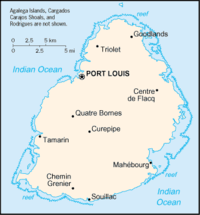

Together with Réunion and Rodrigues, Mauritius is part of the Mascarene Islands. This archipelago was formed in a series of undersea volcanic eruptions 8-10 million years ago, as the African plate drifted over the Réunion hotspot. They are no longer volcanically active, and the hotspot now rests under Réunion. The island of Mauritius itself is formed around a central plateau, with its highest peak in the southwest, Piton de la Petite Rivière Noire at 828 metres (2,717 ft). Around the plateau, the original crater can still be distinguished from several mountains.
The local climate is tropical, modified by southeast trade winds; there is a warm, dry winter from May to November and a hot, wet, and humid summer from November to May. Anti-cyclones affect the country during May to September. Cyclones affect the country during November-April. Hollanda (1994) and Dina (2002) were the worst two last cyclones to have affected the island.

The island's capital and largest city is Port Louis, in the northwest. Other important towns are Rose-Hill and Beau-Bassin, Curepipe, Vacoas, Phoenix, Quatre Bornes.
The island is well known for its natural beauty. Author Mark Twain, for example, noted in Following the Equator, his personal travelogue, "You gather the idea that Mauritius was made first and then heaven, and that heaven was copied after Mauritius". (This quote is often taken out of context. Twain actually wrote: "From one citizen you gather the idea that Mauritius was made first, and then heaven; and that heaven was copied after Mauritius. Another one tells you that this is an exaggeration…")
Environment
Districts and dependencies
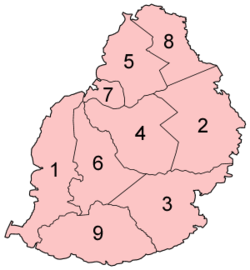
The island of Mauritius itself is divided into nine districts:
- Black River (Capital: Bambous)
- Flacq (Capital: Centre de Flacq)
- Grand Port (Capital: Mahebourg)
- Moka (Capital: Quartier Militaire)
- Pamplemousses (Capital: Triolet)
- Plaines Wilhems (Capital: Beau Bassin and Rose Hill,Phoenix)
- Port Louis (Capital of Mauritius)
- Rivière du Rempart (Capital: Mapou)
- Savanne (Capital: Souillac)
Dependencies
- Rodrigues, an island 560 kilometres north-east of Mauritius, which attained limited autonomy in October 2002.[14][15] It had the status of the 10th administrative district of Mauritius before autonomy was attained.[16]
- Agalega, two small islands about 933 kilometres (580 mi) north of Mauritius, famous for supplying chickens.
- Cargados Carajos Shoals, also known as the Saint Brandon islands, about 402 kilometres (250 mi) north of Mauritius.
Other Mauritian territories
- Soudan Banks (including East Soudan Bank)
- Nazareth Bank
- Saya de Malha Bank
- Hawkins Bank
Mauritius also claims the following territories:[17]
- Tromelin Island, currently in French possession.
- Chagos Archipelago, currently a British possession as the British Indian Ocean Territory (BIOT).
Economy
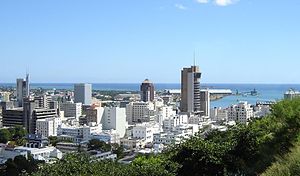
Since independence in 1968, Mauritius has developed from a low-income, agriculturally based economy to a middle income diversified economy with growing industrial, financial, and tourist sectors. For most of the period, annual growth has been of the order of 5% to 6%. This has been reflected in increased life expectancy, lowered infant mortality and an improved infrastructure.
Estimated at US$10,155 for 2005 at purchasing power parity (PPP),[18] Mauritius has the seventh-highest GDP per capita in Africa, behind Réunion (US$19,233 at real exchange rates),[19] Seychelles (US$13,887 at PPP), Gabon (US$12,742 at PPP), Botswana (US$12,057 at PPP), Equatorial Guinea (US$11,999 at PPP), and Libya (US$10,727 at PPP).[18] The economy is mainly dependent on sugarcane plantations, tourism, textiles, and services, but other sectors are rapidly developing as well. Mauritius, Libya, and Seychelles are the only three African nations with a "high" Human Development Index rating (Réunion, as part of France, is not listed by the UN in their Human Development Index ranking).
Sugar cane is grown on about 90% of the cultivated land area and accounts for 25% of export earnings. However, a record-setting drought severely damaged the sugar crop in 1999. The government's development strategy centres on foreign investment. Mauritius has attracted more than 9,000 offshore entities; many aimed at commerce in India and South Africa while investment in the banking sector alone has reached over $1 billion. Economic performance during the period from 2000 through 2004 combined strong economic growth with unemployment at 7.6% in December 2004. France is the country's biggest trading partner, has close ties with the country, and provides technical assistance in various forms.
In order to provide locals with access to imports at lower prices and attract more tourists going to Singapore and Dubai, Mauritius is gearing towards becoming a duty-free island within the next four years. Duty has been eliminated for several products and decreased for more than 1850 products including clothing, food, jewelry, photographic equipment, audio visual equipment and lighting equipment.[20] In addition, reforms aimed at attracting new business opportunities have also been implemented. But, one of the biggest black spot is the traffic movement between the towns, which is slowing the development of Mauritius. The corporate tax has recently been reduced to 15% to encourage non resident companies to trade or invest through a permanent establishment or otherwise. [citation needed].
A plan by ADB Networks calls for Mauritius to become the first nation to have coast-to-coast wireless internet access. The wireless hot spot currently covers about 60% of the island and is accessible by about 70% of its population.
Mauritius ranks first among all countries in FDI inflows to India, with cumulative inflows amounting to US$10.98 billion. The top sectors attracting FDI inflows from Mauritius between January 2000 and December 2005 were electrical equipment, telecommunications, fuels, cement and gypsum products and services sector (financial and non-financial).[21]
Transportation
Transport has been free since July 2005.
Education in the country
Mauritius has a specific educational system. Education from pre-primary through tertiary is free for each citizen born in the country. Most prestigious schools are government-run, which are designated as Star Schools. The most prestigious school in the country is 'College du Saint Esprit' as it has a percentage of 98% pass for HSC examinations (A-level) and it produces students being among the first in the World especially in physics. Even if the college is not a government school, citizens consider the college as a Star School because of the excellent test results at the end of each year. Admission is competitive and all students must sit for an examination in Mathematics, English, French and Science.
The following are a selection of the most prestigious schools in descending order of seniority:
State Schools
- Mahatma Gandhi Institute
- Queen Elizabeth College
- Royal College Curepipe
- Royal College Port-Louis (Mauritius)
- Dr Regis Chaperon State Secondary School
- John Kennedy College
Catholic Schools
Private Schools
Demographics
Mauritian society includes people from many different ethnic groups. A majority of the republic's residents are the descendants of people from India. Mauritius also contains substantial populations from continental Africa, Madagascar, France, Great Britain, and China, among other places.
Religion
Hinduism is the majority religion in Mauritius followed by Christianity and Islam arrives in third position. Buddhist and Chinese faiths are also found. Hindus make up 52%, Christians 28%, Islam at 14.4% and other unspecified religions or atheists round up to 2% . There is supposedly also a significant migrant population of Bhumihar Brahmins in Mauritius who have made a mark for themselves in different fields and they are still in touch with their family members in India and there are instances of marital relations between them to keep their cultural identity intact.[22] Churches and Chinese and Dravidian Tamil pagodas and temples are found in large numbers.[23]
Language
The official language of Mauritius is English. All government administrative documents are therefore drawn up in English. Article 49 of the constitution also allows any member of the National Assembly of Mauritius to address the chair in French. Together with English, Mauritian Creole is also used in instructions in the educational system. However, all exams are taken in English as the education system follows the British education system. The majority of students in primary schools are taught an oriental language.[vague] Though French predominates in the media, a big proportion of television and radio programming are in oriental languages. In business and in corporate affairs, English and Creole prevail.
The most widely-spoken language is Mauritian Creole, which has close ties with French pronunciation, but with a few marked differences. Mauritian Creole is considered to be the native tongue of the country. Most Creoles are Christian. Hindus include Tamils, Muslims descended from Uttar Pradesh, Bihar and from Gujarat (mainly Surat). The Sino-Mauritian community follow mainly Roman Catholicism, Buddhism and Confucian traditions.[24]
Culture

The cuisine of Mauritius is a blend of Indian, Creole, Chinese and European influences. It is common for a combination of cuisines to form part of the same meal.
The production of rum is widespread on the island. Sugarcane was first introduced to Mauritius by the Dutch in 1638. The Dutch mainly cultivated sugarcane for the production of "arrack", a precursor to rum. However, it was during the French and British administrations that sugar production was fully exploited, which considerably contributed to the economical development of the island.[citation needed] Pierre Charles François Harel was the first to propose the concept of local distillation of rum in Mauritius, in 1850.
The sega is a local folklore music. Sega has African roots, and main traditional instruments for producing the music are goat-skin percussion instruments called ravane and metallic clicks using metal triangles. The songs usually describe the miseries of slavery, and has been adapted nowadays as social satires to voice out inequalities as felt by the blacks. Men are usually at the instruments while women perform an accompanying dance which is more often erotic.[24]
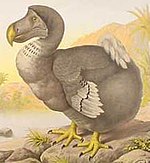
In 1847, Mauritius became the fifth location in the world to issue postage stamps. The two types of stamps issued then, known as the Mauritius "Post Office" stamps, consisting of a "Red Penny" and a "Blue Two Pence" denomination, are probably the most famous and valuable stamps in the world.
When it was discovered, the island of Mauritius was the home of a previously unknown species of bird, which the Portuguese named the dodo (simpleton), as they appeared to be not too bright. By 1681, all dodos had been killed by the settlers or by their domesticated animals. An alternate theory suggests that the imported wild boars that were set free destroyed the slow-breeding dodo population. The dodo is prominently featured as a supporter of the national coat-of-arms (see above).
The island has also given rise to a diversified literature, prominent in the French, English, and Creole languages. Jean-Marie Gustave Le Clézio, the 2008 recipient of the Nobel Prize in Literature, is of Franco-Mauritian origin and lives on the island for part of each year.
In Mauritius the following festivals Christmas, Cavadee, Chinese New Year, Père Laval, Mahashivratri and Eid Al-Fitr are celebrated.[24] Mauritius should also be discovered in the back-country, where the culture is highly contrasting with what is seen in the cities.
Recreational activities in Mauritius are quite varied to support the local tourism industry. Water sports are facilitated as the island is surrounded with coral reef, providing plenty of relatively shallow and calm water. Activities such as deep sea fishing, windsurfing, water-skiing, cruising in yachts and even submarines are some of the many water based recreations available.
Land based leisure activities include deer hunting, quad & mountain biking, abseiling, zip lining, horse riding and trekking. But are often practiced by the rich society.
International rankings
| Survey | Organisation | Ranking |
|---|---|---|
| Index of Economic Freedom 2008 | Heritage Foundation/The Wall Street Journal | 18 out of 157 |
| Corruption Perceptions Index 2008 | Transparency International | 41 out of 180 |
| Ease of Doing Business Index (2009 report) | World Bank Group | 24 out of 181 |
| Digital Opportunity Index (2007) | International Telecommunication Union | 50 out of 181 |
| Press Freedom Index (2007) | Reporters Without Borders | 25 out of 169 |
| Human Development Index | United Nations Development Programme | 65 out of 177 |
See also
References
- ^ "Article 49 of The Constitution". National Assembly of Mauritius. Retrieved 2009-02-08.
- ^ a b c d "Mauritius". International Monetary Fund. Retrieved 2008-10-09.
- ^ Mauritius turns the clock forward in October 2008
- ^ "Republic of Mauritius, Government Portal (Mauritius)".
- ^ The Constitution
- ^ "Population and Vital Statistics, Republic of Mauritius, Year 2007 - Highlights". Central Statistics Office (Mauritius). 2008. Retrieved 2008-05-26.
{{cite web}}: Unknown parameter|month=ignored (help) - ^ "CIA - The World Factbook -- Mauritius". CIA. Retrieved 2007-05-04.
- ^ Mutch, T. D. (1942). The First Discovery of Australia. Sydney: Project Gutenberg of Australia. p. 55., p.13.
- ^ The Hudson River in North America was first named "Mauritius River" for the same Stadtholder.
- ^ Human Rights Committee Takes Up Report of Mauritius: Experts Praise Creation of National Human Rights Commission but Raise Concerns Regarding Anti-Terrorism Law, 18 March 2005 - retrieved 8 January 2007
- ^ CIA World Factbook: Mauritius Introduction
- ^ The Government And The Constitution
- ^ "Mauritius and Equatorial Guinea granted associated observer status in CPLP". macauhub.com. 2006-07-17. Retrieved 2007-03-05.
- ^ "First Day Cover: Rodrigues Regional Assembly". The Mauritius Post Ltd. 2004-10-12. Retrieved 2007-06-27.
- ^ "Rodrigues: achievements after three years of autonomy". Government of Mauritius. 2005-10-25. Retrieved 2007-06-27.
- ^ "Facts about the land, people, history, government, political conditions, economy, foreign relations of Mauritius. - Government and political conditions". Bureau of African Affairs. U.S Department of State. 2007. Retrieved 2007-06-22.
{{cite web}}: Unknown parameter|month=ignored (help) - ^ "CIA - The World Factbook -- Mauritius". CIA. Retrieved 2007-11-194.
{{cite web}}: Check date values in:|accessdate=(help) - ^ a b World Bank. "2005 International Comparison Program" (PDF). Retrieved 2008-04-07.
- ^ Template:Fr icon INSEE Réunion. "11.1 - RÉSULTATS ÉCONOMIQUES" (PDF). Retrieved 2008-04-07.
- ^ Duty-free plan in Mauritius, TREND-News.com, 04-06-2005
- ^ "India and Mauritius To Work For Greater FDI Inflow into India's Infrastructure". Government of India, Department of Commerce. 2006-04-18. Retrieved 2008-10-11.
{{cite news}}: Cite has empty unknown parameter:|coauthors=(help) - ^ Thapan (ed.), Meenakshi (2005). Transnational Migration and the Politics of Identity. SAGE. p. 320. ISBN 978-0761934257.
{{cite book}}:|last=has generic name (help) - ^ Mountain, Alan; et al., "Mauritius", This is Mauritius, p. 53 - 54
{{citation}}: Explicit use of et al. in:|first=(help) - ^ a b c Macdonald, Fiona; et al., "Mauritius", Peoples of Africa, p. 340 - 341
{{citation}}: Explicit use of et al. in:|first=(help)
Further reading
- Macdonald, Fiona (2001). "Mauritius". Peoples of Africa. US: Marshall Cavendish. ISBN 9780761471585.
{{cite book}}: Unknown parameter|coauthors=ignored (|author=suggested) (help) - Mountain, Alan (2000). This is Mauritius. Struik. ISBN 9781843303015.
{{cite book}}: Unknown parameter|coauthors=ignored (|author=suggested) (help) - Dodd, Jan and Madeleine Philippe. Lonely Planet Mauritius Reunion & Seychelles. Lonely Planet Publications, 2004. ISBN 1-74059-301-4
- Lee, Jacques: Mauritius: Its Creole Language - The Ultimate Creole Phrase Book and Dictionary, Paperback 160 pages (August 15 2005), Publisher: Nautilus, ISBN 0-9511296-4-3.
- Lee, Jacques: Sega: The Mauritian Folk Dance, Paperback 104 pages (December 1990), Publisher: Nautilus, ISBN 0-9511296-1-9
- Khal Torabully, Coolitude : An Anthology of the Indian Labour Diaspora (with Marina Carter, Anthem Press, London, 2002) ISBN 1843310031
External links
- Government of Mauritius
- Chief of State and Cabinet Members
- Mauritius Yellow Pages
- Mauritius Portal
- "Mauritius". The World Factbook (2024 ed.). Central Intelligence Agency.
- Mauritius from UCB Libraries GovPubs
- Template:Dmoz
 Wikimedia Atlas of Mauritius
Wikimedia Atlas of Mauritius- Template:Wikitravel
- Other




